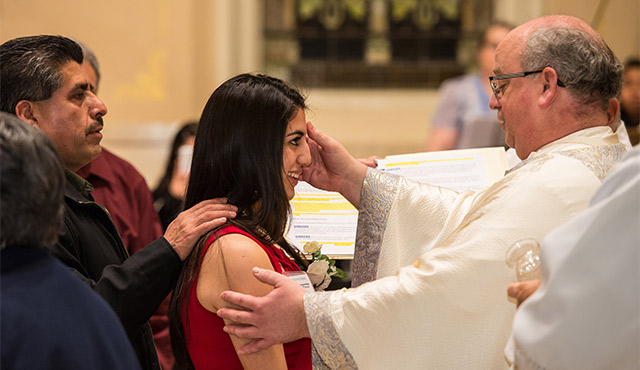When it comes to the sacrament of confirmation, Katie Dawson wants to clear up a widely held misunderstanding.
“I have often heard that confirmation is when a child becomes an adult, and that’s exactly wrong,” says Dawson, director of Parish Faith Formation for the Diocese of Orange. “That’s not what confirmation is.”
Indeed, while many Catholics view the sacrament as the time when a young person comes of age, confirmation actually is about the individual’s journey of faith.
Confirmation is rooted in the holy day of Pentecost when God as the Holy Spirit descended upon the apostles. It is the sacrament that solidifies a person’s relationship with Christ that began with baptism and “further strengthens them in their capacity to defend and spread the faith,” as the apostles set out to do, says Bishop Robert Barron, Auxiliary Bishop of the Archdiocese of Los Angeles.
“I told those I confirmed that they are, in a certain sense, successors of those first men upon whom the Holy Spirit descended and that they have the same fundamental task,” Barron wrote in a recent blog post about performing the sacrament for the first time.
“Their confirmation, I further explained, is therefore not really for them; it is for the church and the wider world,” he writes.
Confirmation is one of the three sacraments of initiation, with baptism, first Holy Communion and confirmation inextricably linked, Dawson says.
“These three sacraments are the gateway to full membership in the body of Christ,” she says. “There is a deep transformation when we are baptized, receive the Holy Eucharist and are confirmed, and confirmation puts the seal on our initiation.”
In the early church it was not uncommon to deliver all three sacraments at the same time. They were delivered by a bishop when he was in town to confirm eligible followers. Today confirmation is administered to high school students, usually at the age of 14 or 15.
“Some bishops saw that it would be practical to push it into high school so kids would be better able to understand it since they were older,” Dawson says.
There was also a desire to separate the sacrament from elementary school and graduation. “We didn’t want the sacrament linked to a school schedule,” she says.
A candidate for confirmation selects a sponsor who can guide them through the process. Responsibilities include attending mass on Sundays and Holy Days of Obligation and participating in church service projects with the confirmation candidate.
“This person is to be an active and engaged Catholic who, with word and action, lives out their faith,” according to the Diocese of Orange, which also recommends selecting a godparent involved in the candidate’s baptism as a way of linking the two sacraments.
A confirmee also chooses a saint name, a decision that must be carefully considered, Dawson says.
“What we want young people to do is to identify someone that they can look to as a model of faith, someone that they find appealing,” she says. “Maybe that person has ideals and circumstances in connection with the child. Maybe it is someone who is exciting and interesting, a saint of heroic virtue, someone who did great things.”
Whomever the confirmation candidate chooses for their saint name, it should be a saint that the candidate should aspire to emulate, Dawson advises.
“They should be saints who encourage us to be better,” she says.

